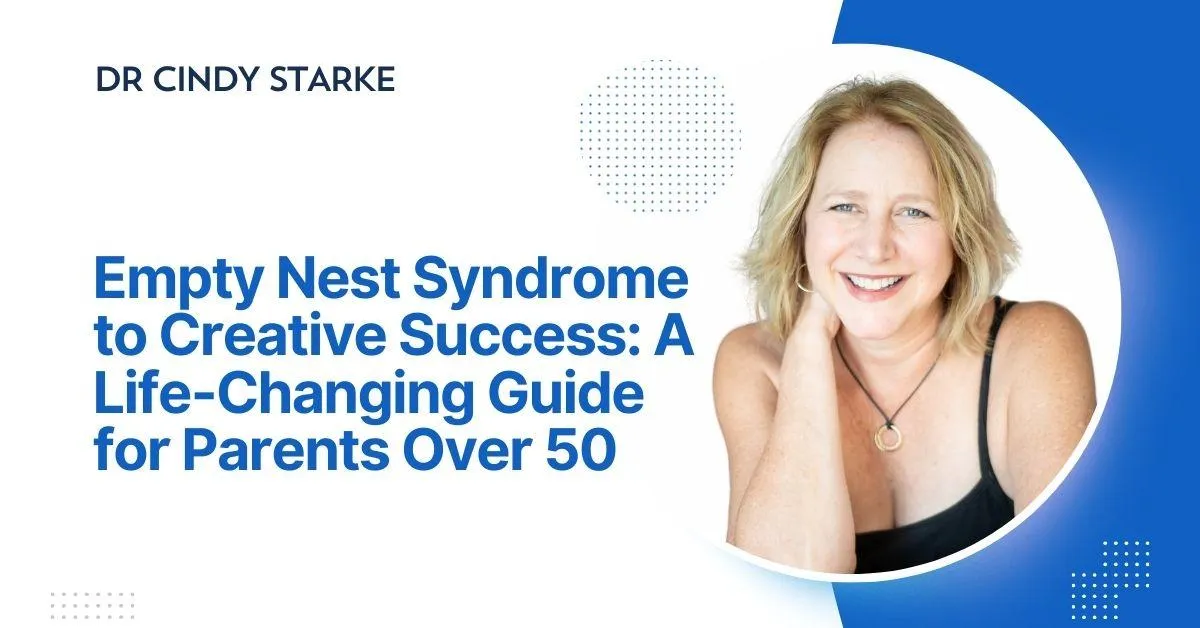BLOG

Empty Nest Syndrome to Creative Success: A Life-Changing Guide for Parents Over 50
The house feels different now. The rooms that once echoed with teenage laughter and constant activity now stand silent. If you're experiencing this profound shift as your children leave home, you're not alone. Empty nest syndrome affects millions of parents worldwide, but what if this new chapter could become your most creative and fulfilling one yet?
Understanding Empty Nest Syndrome in Modern Times
Empty nest syndrome, while not a clinical diagnosis, represents a genuine period of transition and emotional adjustment. Today's parents, particularly those over 50, face this transition in a uniquely challenging era. With increased longevity and better health, this phase of life offers unprecedented opportunities for personal reinvention.
Common symptoms of empty nest syndrome include:
- Feelings of loss and sadness
- Identity confusion
- Relationship adjustments with your partner
- Changes in daily routines and purposes
- Unexpected emotional triggers

Research suggests that this transitional phase can become a springboard for remarkable personal growth and unleashed creativity.
The Science Behind Empty Nest Syndrome and Creativity
Recent neuroscience research reveals fascinating connections between life transitions and creative potential. When we experience major life changes, our brains become more adaptable and receptive to new experiences. Dr. Sarah Thompson, a leading neuroscientist, explains: "The brain's neuroplasticity during periods of significant life change makes it an ideal time to explore creative pursuits."
Studies published in the Journal of Creative Behavior indicate that engaging in artistic activities can:
- Reduce stress and anxiety by up to 75%
- Increase production of feel-good hormones
- Improve cognitive function
- Enhance emotional processing
- Strengthen neural connections
5 Signs You're Ready to Transform Your Empty Nest into a Creative Haven
1. You find yourself drawn to old hobbies you once loved
2. You're re organizing spaces in your home
3. You're seeking new ways to express yourself
4. You feel a surge of energy for new projects
5. You're reminiscing about creative dreams you once had
Discovering Your Creative DNA After 50
Contrary to popular belief, creativity doesn't diminish with age. Many renowned artists, writers, and creators produced their most significant work after 50. Georgia O'Keeffe painted some of her most famous pieces in her 60s and continued working well into her 90s.
Understanding your "Creative DNA" involves:
Reconnecting with Childhood Passions
- What activities made you lose track of time as a child?
- What creative pursuits did you abandon for practical reasons?
- Which forms of expression have always intrigued you?
Exploring New Artistic Territories
Think beyond traditional art forms. Today's creative landscape includes:
- Digital art and photography
- Creative writing and blogging
- Pottery and ceramics
- Textile arts and fiber crafts
- Mixed media exploration

Practical Steps to Begin Your Creative Journey
Creating a sustainable creative practice requires intention and structure. Here's how to build your creative foundation:
1. Create Your Sacred Space
- Designate a specific area for creative work
- Ensure good lighting and comfortable seating
- Organize basic supplies within easy reach
- Make it inviting and inspiring
2. Establish Your Creative Routine
- Start with 15-30 minutes daily
- Choose your most energetic time of day
- Set boundaries to protect your creative time
- Use time-blocking techniques
3. Begin with Achievable Projects
- Start with simple, completable projects
- Focus on process over perfection
- Document your progress
- Celebrate small wins
Overcoming Common Creative Blocks
Fear and Perfectionism
- Remember: perfectionism is the enemy of creativity
- Start before you feel ready
- Embrace imperfection as part of the process
- Join supportive creative communities
Time Management
- Use the "15-minute rule" - commit to just 15 minutes
- Schedule creative time like any important appointment
- Learn to say no to non-essential commitments
- Use time-tracking apps to understand your patterns
Building Confidence
- Take classes to build technical skills
- Share your work with supportive friends
- Document your progress
- Connect with other creative empty nesters
Resources and Communities for Creative Empty Nesters
Local Resources
- Community art centers
- Adult education programs
- Library workshops
- Local artist cooperatives
Online Learning Platforms
- Skillshare
- Udemy
- Coursera
- YouTube tutorials
Supportive Communities
- Facebook groups for creative empty nesters
- Local meetup groups
- Online art challenges
- Virtual creative circles
Moving Forward: Your Creative Action Plan
1. Week One: Explore different creative mediums
2. Week Two: Set up your creative space
3. Week Three: Establish a daily creative practice
4. Week Four: Join a creative community or class
Remember, this transition from empty nest syndrome to creative fulfillment is a journey, not a destination. Each small step forward is progress, and every creative experiment brings you closer to discovering your unique artistic voice.

Conclusion
Empty nest syndrome marks not an ending, but a beginning – an invitation to rediscover and reinvent yourself through creativity. Your years of nurturing others have given you rich life experience to draw from in your creative pursuits. Now is your time to explore, express, and evolve.
Embrace this new chapter knowing that creative fulfillment comes not from flawless execution, but through self-expression, exploration, and the pure joy of creation. Your empty nest isn't just a reminder of what was; it's a canvas awaiting your unique creative vision.
Ready to begin your creative transformation? Download our free guide "Creative Beginnings After 50" or schedule a discovery call to learn how coaching can support your creative journey.
Ready To Get Started?
Subscribe
COURSES
Doctors Freedom
Female Medical Professional
Rocksolid Cure
RESOURCES
Copyright © 2024 Dr Cindy Starke
